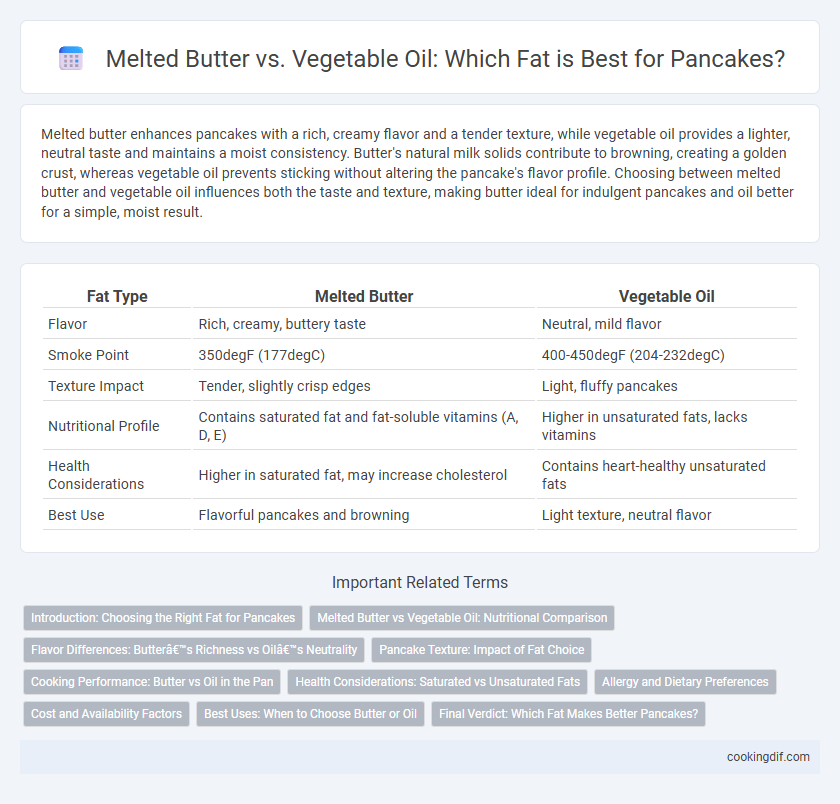Melted butter enhances pancakes with a rich, creamy flavor and a tender texture, while vegetable oil provides a lighter, neutral taste and maintains a moist consistency. Butter's natural milk solids contribute to browning, creating a golden crust, whereas vegetable oil prevents sticking without altering the pancake's flavor profile. Choosing between melted butter and vegetable oil influences both the taste and texture, making butter ideal for indulgent pancakes and oil better for a simple, moist result.
Table of Comparison
| Fat Type | Melted Butter | Vegetable Oil |
|---|---|---|
| Flavor | Rich, creamy, buttery taste | Neutral, mild flavor |
| Smoke Point | 350degF (177degC) | 400-450degF (204-232degC) |
| Texture Impact | Tender, slightly crisp edges | Light, fluffy pancakes |
| Nutritional Profile | Contains saturated fat and fat-soluble vitamins (A, D, E) | Higher in unsaturated fats, lacks vitamins |
| Health Considerations | Higher in saturated fat, may increase cholesterol | Contains heart-healthy unsaturated fats |
| Best Use | Flavorful pancakes and browning | Light texture, neutral flavor |
Introduction: Choosing the Right Fat for Pancakes
Melted butter enhances pancakes with a rich, creamy flavor and a tender crumb, making it a popular choice among traditional recipes. Vegetable oil, on the other hand, offers a neutral taste and maintains moistness without overpowering other ingredients, ideal for a lighter texture. Selecting between melted butter and vegetable oil depends on whether flavor richness or lightness is the priority in your pancake batter.
Melted Butter vs Vegetable Oil: Nutritional Comparison
Melted butter contains saturated fats and small amounts of vitamins A and E, which contribute to its creamy flavor and richness in pancakes, while vegetable oil is typically rich in unsaturated fats that support heart health. Butter provides about 102 calories and 12 grams of fat per tablespoon, including about 7 grams of saturated fat, whereas vegetable oil offers approximately 120 calories with mostly unsaturated fats and no cholesterol. Choosing between melted butter and vegetable oil impacts the nutritional profile of pancakes, balancing flavor, health benefits, and fat type.
Flavor Differences: Butter’s Richness vs Oil’s Neutrality
Melted butter imparts a rich, creamy flavor to pancakes, enhancing their overall taste with a subtle nuttiness and a slightly caramelized aroma when cooked. Vegetable oil, by contrast, offers a neutral flavor profile, allowing other ingredients such as spices or syrups to take center stage without competing richness. Choosing butter elevates the sensory experience through its distinctive taste, while oil provides a versatile base that keeps the pancake's flavor light and adaptable.
Pancake Texture: Impact of Fat Choice
Melted butter contributes a rich, tender texture to pancakes by adding moisture and a slight crispness to the edges, enhancing overall flavor complexity. Vegetable oil creates a softer, more uniform crumb with a less pronounced buttery taste, resulting in a lighter, fluffier pancake. Choosing between melted butter and vegetable oil directly affects pancake texture, moisture retention, and flavor profile, influencing the final eating experience.
Cooking Performance: Butter vs Oil in the Pan
Melted butter creates a rich, golden crust on pancakes due to its milk solids that caramelize during cooking, enhancing flavor and texture. Vegetable oil offers a higher smoke point, allowing pancakes to cook evenly without burning at higher temperatures, resulting in a consistently tender interior. The choice between butter and oil significantly impacts cooking performance, with butter providing superior taste and oil delivering better heat stability.
Health Considerations: Saturated vs Unsaturated Fats
Melted butter contains higher levels of saturated fats, which can raise LDL cholesterol and increase the risk of heart disease when consumed in excess. Vegetable oil typically provides unsaturated fats, including monounsaturated and polyunsaturated fats, known to support heart health by lowering bad cholesterol levels. Choosing vegetable oil over butter in pancake recipes can improve nutritional profile by reducing saturated fat intake and enhancing intake of beneficial unsaturated fats.
Allergy and Dietary Preferences
Melted butter contains dairy proteins and lactose, which can trigger allergic reactions or intolerance in individuals sensitive to dairy. Vegetable oil is typically free from common allergens, making it a safer choice for those with dairy allergies or following a vegan diet. Choosing vegetable oil supports dietary preferences requiring non-animal fats while maintaining moisture and texture in pancakes.
Cost and Availability Factors
Melted butter offers rich flavor but tends to be more expensive and less shelf-stable compared to vegetable oil, which is typically cheaper and widely available in most grocery stores. Vegetable oil's longer shelf life and lower cost make it a practical choice for budget-conscious bakers and those needing consistent availability. Choosing between the two depends on whether flavor richness or economic efficiency and accessibility are prioritized in pancake preparation.
Best Uses: When to Choose Butter or Oil
Melted butter enhances pancake flavor and browning, making it ideal for classic buttermilk pancakes and those requiring a rich, creamy taste. Vegetable oil provides a neutral flavor and higher smoke point, perfect for lighter, fluffier pancakes or when cooking at higher temperatures. Choosing butter is best for traditional recipes, while oil suits vegan or allergen-friendly options and faster cooking methods.
Final Verdict: Which Fat Makes Better Pancakes?
Melted butter imparts a rich, creamy flavor and tender texture to pancakes, enhancing overall taste and mouthfeel. Vegetable oil creates a lighter, fluffier pancake with a neutral taste, allowing other ingredients to stand out. For superior flavor and texture, melted butter remains the preferred fat for making better pancakes.
Melted butter vs vegetable oil for fat Infographic

 cookingdif.com
cookingdif.com